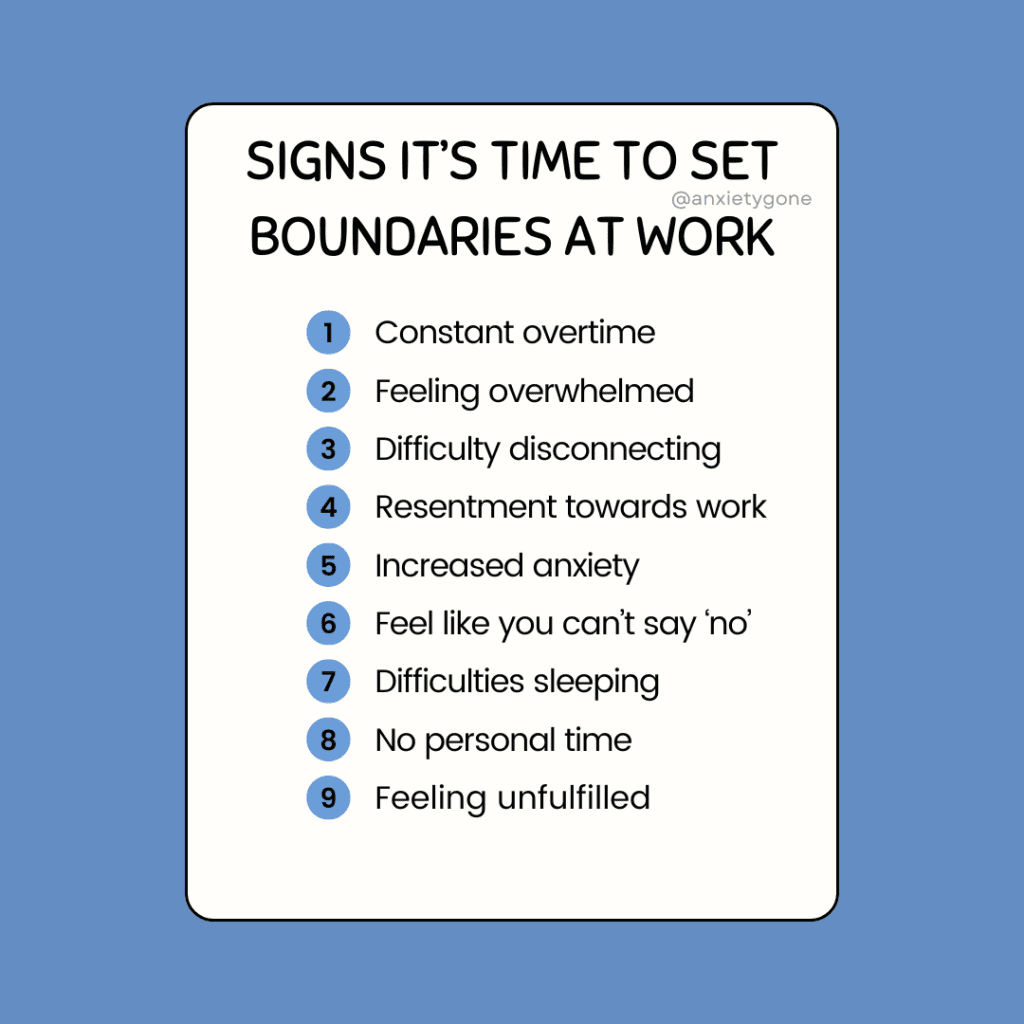Full Disclosure: Clicking on these links could mean a tiny commission for me, at no extra cost to you.
Setting boundaries at work isn’t just about saying no; it’s about clearly defining your personal space, time and responsibilities so that you can perform at your best without burning out. In today’s always-on work culture, knowing how to establish these limits is crucial not only for your mental health but also for your career longevity. This blog post will explore 10 vital tips to help you create and maintain boundaries that protect your peace of mind (and your job).
What Are Boundaries?
10 Tips for Setting Boundaries At Work
Setting boundaries at work can be complicated. You don’t want to overstep your position and jeopardize your job, but you also have rights and deserve to be respected in your workplace. These tips will help you learn the appropriate process for setting boundaries at work.
1. Know Your Limits
Understanding your own limits is the first step to setting boundaries. Reflect on what you can handle mentally and physically without feeling overwhelmed. Are long hours draining you? Does multitasking across several projects make you anxious? Recognize these limits and use them as a guide to assert your boundaries.
2. Communicate Clearly
Once you know your limits, communicate them clearly to your colleagues and supervisors. Be assertive but polite in expressing your needs. For example, if you cannot take on extra work, explain why and offer alternatives when possible. Clear communication can prevent misunderstandings that might otherwise lead to conflict or additional stress.
3. Prioritize Your Tasks
Not everything on your to-do list is of equal importance. Learn to prioritize tasks based on urgency and significance. This helps in managing expectations with your team and supervisor, as you can focus on what truly matters without spreading yourself too thin.
4. Learn to Say No
One of the most straightforward yet challenging aspects of boundary-setting is learning to say no. If a request doesn’t fit your priorities or capabilities, be prepared to decline politely. Saying no is a vital skill that will protect your time and prevent work overload.
5. Set Work Hours and Stick to Them
Especially in a world where remote work is common, it’s important to establish clear work hours. Let your team know your availability and stick to these hours. Logging off at a regular time each day helps establish a routine and signals to others when you are and aren’t available for work discussions.
6. Create Physical or Virtual Space
If you work in an office, setting up your workspace to minimize unwanted interruptions can help. Use headphones or a do not disturb sign when you need to focus. For remote workers, keeping a dedicated workspace can similarly help in mentally separating work from home life.
7. Use Technology Mindfully
Technology can blur the lines between work and personal time. Utilize tools like email filters, notification settings, and calendar blockers to protect your off-hours. Make sure your team knows that just because a message can be sent after hours doesn’t mean it needs to be answered immediately.
8. Delegate When Necessary
You don’t have to do everything yourself. If you have too much on your plate, see if some tasks can be delegated to others. Not only does this lighten your load, but it also helps build trust and teamwork within your department.
9. Regular Check-ins with Supervisors
Having regular meetings with your boss can ensure you’re on the same page regarding your workload and boundaries. Use these check-ins to discuss your progress and any adjustments needed to keep your workload manageable.
10. Protect Your Private Time
Finally, make your private time sacred. Avoid the temptation to check work emails or messages during personal hours. This separation is crucial for mental well-being and helps maintain enthusiasm and clarity when you are working.
Conclusion
Setting boundaries at work is essential for maintaining both your mental health and your professional effectiveness. By implementing these 10 tips, you can create a work environment that respects your personal limits and contributes to your overall job satisfaction and productivity. Remember, setting boundaries not only benefits you but also sets a standard for others about how they can maintain a healthy work-life balance themselves.
FAQs
- What if my boss is resistant to my boundaries?
If your boss resists your boundaries, provide them with clear reasons why these limits are necessary for your effectiveness at work. Offer solutions and alternatives that align with your boundaries while still meeting job requirements. - Can setting boundaries at work make me look uncooperative?
Setting boundaries, when done respectfully and reasonably, actually shows professionalism and self-awareness. It demonstrates your commitment to maintaining high-quality work and your long-term health and productivity.









